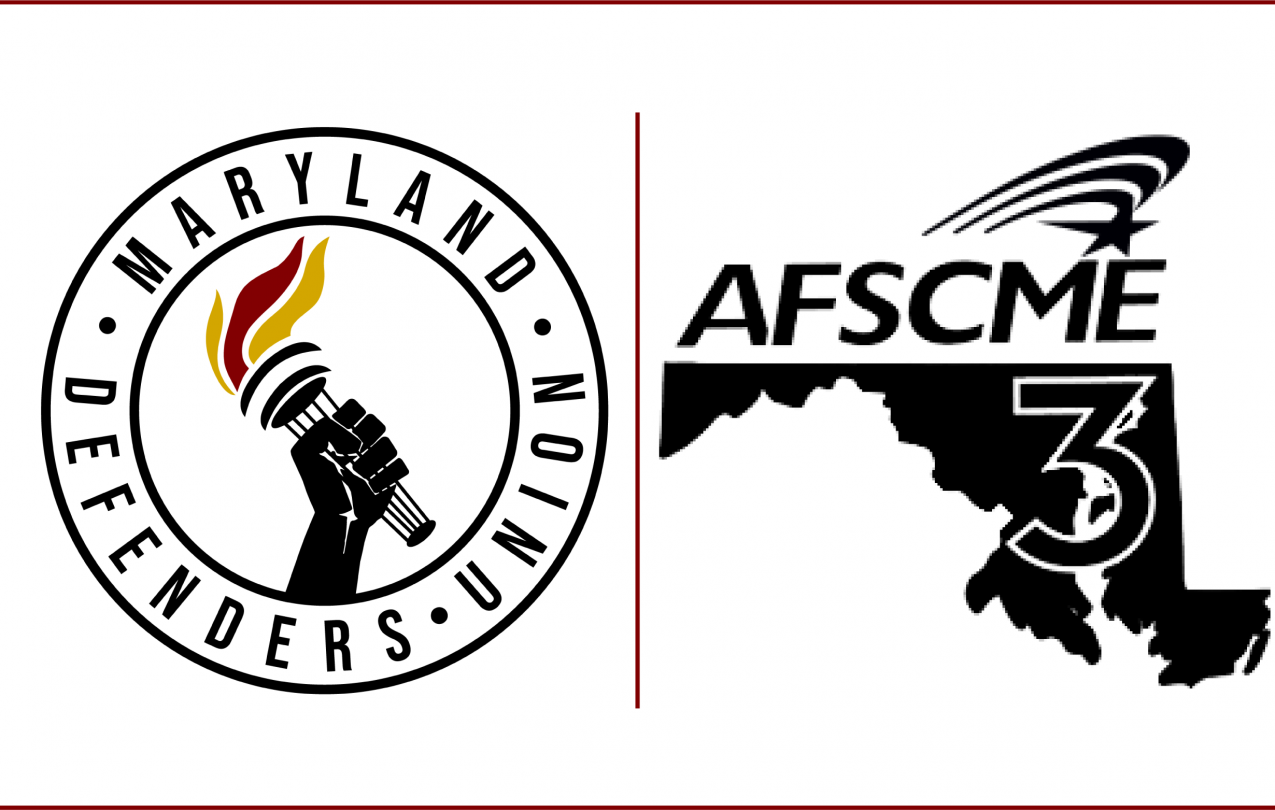The Maryland Defenders Union (MDU) has decided to unionize with AFSCME Council 3, the Maryland-wide affiliate of the American Federation of State, County and Municipal Employees, to which dozens of OPD core staff and social workers already belong.
We are proud to stand in solidarity with the 50,000 state, county and higher education employees across Maryland who are represented by AFSCME.
We made the choice to organize under AFSCME after thoughtful consideration of the benefits and detriments of such an affiliation. Though there is no such thing as a perfect union for public defenders, joining AFSCME gives us the greatest power to make the changes we desperately need in order to do our jobs with excellence and in a manner that is sustainable.
We recognize that AFSCME Council 3 also represents several groups of state employees whose work requires them to participate in a legal system that oppresses our clients. These groups include correctional officers at Baltimore detention centers and at prisons throughout the state, and the staff of the Department of Juvenile Services, the Department of Parole and Probation, and the Department of Social Services. (Click here for a full list of AFSCME Maryland locals.)
As public defenders, our mission is sometimes directly at odds with the work of these groups, and we recognize that our interests will not always align with theirs. As public defenders, we will never allow this affiliation to compromise the work we do on behalf of our clients. Our local -- the group comprising all MDU workers -- will determine what demands to make of our own management. We look forward to collaborating with our fellow AFSCME members on legislative goals that we share, and to helping to shape Council 3's legislative priorities. But if and when our clients' interests diverge from those of other locals, we will strive to make decisions independent of them about what legislation to support.
But, much of the time, our interests will align with those of our fellow AFSCME members. We, like them, believe that we all deserve safe working conditions, that we need protections when we speak out against injustice in the workplace, and that cuts to public spending should not be the first reaction to a budget shortfall.
AFSCME is in a unique position to fight for OPD staff to gain the right to collective bargaining, which was important in our decision-making process. Collective bargaining means negotiating with management to reach a binding agreement on many of the issues important to us: working conditions, hiring and promotion practices, benefits and more. Under current state law, OPD staff are explicitly prohibited from participating in collective bargaining. AFSCME has a proven track record of fighting for -- and winning -- collective bargaining rights for other sectors of Maryland employees who used to be exempt as well, including higher education staff in the early 2000s and Charles County workers just this year. AFSCME is committed to fighting for OPD staff to gain collective bargaining rights, which will vastly increase our power as a union.
Dozens of your fellow core staff members are already represented by AFSCME, which was also important in our decision-making process. In order for all of us to be in solidarity -- and present management with a united front -- we must join the union to which so many core staff members already belong.
All powerful unions represent employees whose interests conflict with those of OPD workers in one way or another. We recognize that this partnership is not perfect, and we will remain vigilant to ensure that it does not compromise our values. But we will not let the search for a mythical “perfect” union keep us from standing up together and making our voices heard. We are proud to stand in solidarity with the 50,000 state, county and higher education employees across Maryland who are represented by AFSCME.
AFSCME is the largest union for Maryland state employees. You can read more about AFSCME’s history and its decades of fighting for workers.
